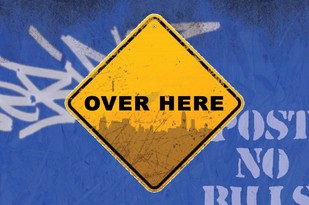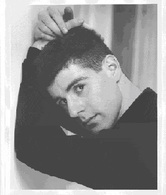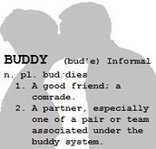
 Below is my Playwright's Note for the program of Mortal Folly Theatre's production of Over Here for the 2014 NYC International Fringe Festival. I am reproducing it here as the play is getting a fair amount of press, and I am frequently asked about it in relation to current events.
0 Comments
 An old headshot. Mock away. An old headshot. Mock away. I've noticed what appears to me to be a disproportionate amount of anxiety from people at several levels of the field about writing bios for programs and such. What I intend to present here is a series of templates and principles that should make the task take under five minutes and be a relatively low stress endeavor. The purpose of the bio is to let the audience (including other industry professionals) know a bit of additional relevant information about you. While to some degree it can serve to establish the credibility of the artistic team, if you are early in your career (or even doing your first show) that is also an interesting bit of information to an audience. (With that in mind please realize that no one worth knowing is going to judge you harshly for being new to the field, so don't worry about having a short bio.) This post is particularly aimed at people early in their careers. Remember that you'll be getting more credits as you go, which means that your bio can change constantly throughout a season. These are all fairly flexible and geared for short bios. Long-form bios are basically expansions on the template. (I have bios for several of the disciplines I work in throughout my site).  Graphic by Alison McDonough Last month I had the pleasure of having a public staged reading of my new full-length play, Burning Up the Dictionary, performed with Vagabond Theatre Group. This took place at Trident Booksellers & Cafe as part of their "There Will Be Words" reading series. Before I say much more I do have to point out that I was very amused to have a play that's largely about language appear in a series called "There Will Be Words." Readings are a step in the development of a new play. I once discussed this process with a computer programmer friend and we realized that we had something significant in common: neither playwrights nor programers really know what they've done until they get to see it running. The staged reading is a sort of a test run of a play wherein the writer can figure out what changes they intend to make as the work evolves. This was the first time I've heard the play in its entirety in front of an audience. I did have the privilege of a table reading of an earlier full draft at the Lark Play Development Center this past November (which I blogged about here) and I got to hear a chunk of it at a Small Theatre Alliance reading back in September (which I also blogged about) after earlier development through Playwrights' Commons' Summer Playground. All three were really useful experiences, and the script has come a long way because of them, but this last piece was a larger step as it was an opportunity for me to evaluate the current (more advanced) draft under more public conditions and figure out what to do with it next.  This past week while I was the guest-tweeter for the LMDA Twitter Project an undergrad from a school in Utah contacted me as part of an assignment for a dramaturgy course she is taking. She was tasked with finding a dramaturg and asking them a series of questions about what they do, their methodologies, and how they interact professionally with their various collaborators. My first thought was that it's been a little while since I was last billed as a dramaturg on a production, so maybe I should refer her to someone else who regularly holds that job description. But then I thought about my favorite recurring discussion at the LMDA Conference I attended at the Banff Centre a year and change ago, where the consensus was that dramaturgy is as much a way of thinking as it is a job description, and that ideally everyone involved in a production should be thinking in dramaturgical terms. Along those same lines, most of the better designers I know across various disciplines generally speak in dramaturgical terms on many levels, so I decided to answer her questions primarily from the perspective of how I apply dramaturgy to fight directing. Below are my answers (with minor edits). I'd also like to thank the student, as her questions made me articulate some stuff I'd been thinking about for a while. Anyway... In order to maintain some momentum in the aftermath of my dissertation defense and subsequent graduation, in the past few months I did a couple of book reviews for scholarly journals. Both reviews will be appearing in the next few months.
My review of Eugenio Barba's latest book, On Directing and Dramaturgy: Burning the House (Routledge: 2009) will appear in the next issue of New England Theatre Journal, and my review of John Donohue's Kage: The Shadow (YMAA: 2011) will soon be appearing in The Journal of Asian Martial Arts. This past Monday I took part in a Small Theatre Alliance of Boston Open Mic Night at the Charlestown Working Theater. I brought in a section of a new full length play I'm working on called Burning Up the Dictionary, which I'm billing as "a story of language, love, lust and loss." I'll be having a round table of the entire thing at the Lark Play Development Center in New York City next month, so this was a great opportunity to test-drive a section of it in front of an audience and see how things play in front of an audience as I work on it in preparation for the Lark. I've been developing it through the Playwrights' Commons/Company One Playwrights' Playground this past summer (which was quite a blessing), but this was the first time I'd heard it in front of an audience as opposed to workshop participants.
This entry will be a long one. But the events are well worth recording.
About ten days ago I returned to Boston from one of my best creative and collaborative experiences in a long time. I am a person who really enjoys what I do, so these are strong words. What I am talking about here is the Playwrights' Commons Freedom Arts Retreat. This was organized by our Fearless Leader, Cruise Director, and Theatre Facilitator Extraordinaire, Ilana Brownstein. The participants besides myself were Philip Berman, Amanda Coffin, Allie Herryman, Colleen Hughes, Emily Kaye Lazzaro, Tyler Monroe, Corianna Moffatt, Nina Morrison, and Jason Weber. I knew very few of the other participants going in, and no one very well. If I may be gushy for a moment, it would be very easy to go through all of these names individually and sing their praises as artists and collaborators. Instead I will praise the synergy created by bringing everyone together and tasking us with creating new work collaboratively. So, here I am with a shiny new web domain. This is all still very much under construction and as I get more fluent in design elements the site should improve.
This is probably a good time and place to discuss some recent and upcoming projects: |
Taking Note & Taking Notes
Meron Langsner, PhD
Playwright, Theatre & Performance Scholar, Fight Director/Movement Specialist, Director, Educator Archives
June 2020
Categories
All
|
 RSS Feed
RSS Feed